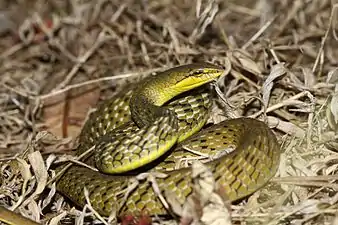Ahaetulla perroteti
Ahaetulla perroteti, known commonly as the bronze-headed vine snake,[4] Perrotet's vine snake,[1] or the Western Ghats bronzeback,[3] is a species of mildly venomous, rear-fanged snake in the family Colubridae. The species is endemic to the Western Ghats in South India.[3]
| Ahaetulla perroteti | |
|---|---|
 | |
| Scientific classification | |
| Domain: | Eukaryota |
| Kingdom: | Animalia |
| Phylum: | Chordata |
| Class: | Reptilia |
| Order: | Squamata |
| Suborder: | Serpentes |
| Family: | Colubridae |
| Genus: | Ahaetulla |
| Species: | A. perroteti |
| Binomial name | |
| Ahaetulla perroteti | |
| Synonyms[2][3] | |
_by_Sandeep_Das.jpg.webp)
Etymology
The specific name, perroteti, is in honor of French naturalist George Samuel Perrottet (1793–1867).[5]
Description
- See snake scales for terminology.
A. perroteti has the following characters. The snout is obtusely pointed and projecting, without dermal appendage, not quite twice as long as the eye. There is no loreal; the internasals and prefrontals are in contact with the labials. The frontal is longer than its distance from the end of the snout, as long as the parietals. There is one preocular, in contact with the frontal, and one postocular. The temporals are arranged 1+2 or 2+2. There are 8 (rarely 9) upper labials, the fourth and fifth entering the eye. The 4 lower labials are in contact with the anterior chin shields, which are as long as the posterior chin shields.[6]
The dorsal scales are in 15 rows at midbody, and those on the sacral region are keeled. The ventrals number 138-140. The anal is divided, and the subcaudals number 70-82.[6]
Males are bright green above, yellowish or pale green beneath, with a green lateral line. Females are drab brownish grey with a yellowish venter.[6]
The total length (including tail) is 2 ft (61 cm). The tail is 5.5 in (14 cm).[6]
Distribution
A. perroteti is endemic to the Nilgiri Hills of the Western Ghats, in south India. It occurs in high-elevation hills, above 1,600 m (5,200 ft), of Kerala and Tamil Nadu states. This species is known from the Upper Nilgiris, including Mukurthi National Park, Silent Valley and Vellarimala or Camel's Hump and Siruvani peak. Perhaps it has the smallest geographic range of all Indian Ahaetulla species.
Biology
A. perroteti is a diurnal, terrestrial snake found actively moving about on open montane grassland above the tree line. It feeds mainly on lizards and frogs. It is seen basking in full sunlight. It rarely if ever ascends trees.
Reproduction
A. perroteti is viviparous.[3]
References
- Srinivasulu, C.; Srinivasulu, B.; Deepak, V.; Achyuthan, N.S. (2013). "Ahaetulla perroteti". IUCN Red List of Threatened Species. 2013: e.T172654A1360027. doi:10.2305/IUCN.UK.2013-1.RLTS.T172654A1360027.en. Retrieved 19 November 2021.
- Günther A (1860). "Note on Psammophis perroteti ". Annals and Magazine of Natural History, Third Series 6: 428-429.
- Ahaetulla perroteti at the Reptarium.cz Reptile Database. Accessed 16 January 2019.
- Laladhas KP, Oommen OV, Sudhakaran PR (2015). Biodiversity Conservation – Challenges for the Future. Sharjah, United Arab Emirates: Bentham Science Publishers. ISBN 9781681080215.
- Beolens, Bo; Watkins, Michael; Grayson, Michael (2011). The Eponym Dictionary of Reptiles. Baltimore: Johns Hopkins University Press. xiii + 296 pp. ISBN 978-1-4214-0135-5. (Ahaetulla perroteti, p. 203).
- Boulenger GA (1890). The Fauna of British India, Including Ceylon and Burma. Reptilia and Batrachia. London: Secretary of State for India in Council. (Taylor & Francis, printers). xviii + 541 pp. (Dryophis perroteti, p. 368).
Further reading
- Duméril AMC, Bibron G, Duméril AHA (1854). Erpétologie générale ou histoire naturelle complète des reptiles. Tome septième [Volume 7]. Deuxième partie, Comprenant l'histoire des serpents venimeux. Paris: Librairie Encyclopédique de Roret. xii + 781–1536. (Psammophis perroteti, new species, pp. 899–900). (in French).
- Ganesh SR, Chandramouli SR (2011). "On the nomenclature and taxonomy of a south Indian colubrid snake Ahaetulla perroteti (Duméril, Bibron & Duméril, 1854)". Herpetological Bulletin (117): 19–24.
- Smith MA (1943). The Fauna of British India, Ceylon and Burma, Including the Whole of the Indo-Chinese Sub-region. Reptilia and Amphibia. Vol. III.—Serpentes. London: Secretary of State for India. (Taylor and Francis, printers). xii + 583 pp. (Dryophis perroteti, p. 373).
